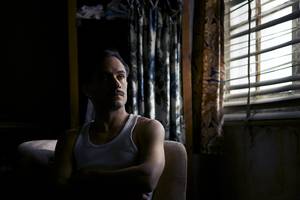“If God is in my verse”
…if God is in my verse,
I am GodIf God is in your distressed eyes,
you are God… (Neruda, Poetry of Neruda 6)
[Please be aware that the following film review contains spoilers.]
In his magnum opus What Is Cinema? French cinema theorist André Bazin argues that cinema is inherently a binary medium because film “is the story of the relations between expressionism and realism” (Bazin 139). Film then is a balance between what the camera physically captures (that interplay between lights, mirrors, and figures) and the possibilities for what that captured image represents (that interplay between symbols, dialogue and their implications). This Bazinian dialectic aptly describes the forces most strongly at play within the latest directorial work of Chilean director Pablo Larraín – Neruda (2016). In what could perhaps be the magnum opus of Larraín’s still burgeoning oeuvre (yes, I am partial to Neruda over his more popular 2016 film Jackie), Larraín focuses upon the true story of Chilean poet Pablo Neruda’s flight from his country; but within that historical account is a surrealistic story of how our identities, for better or worse, are contextual and reliant upon the people within that context.
In the opening moments of the film, Pablo Neruda is challenged to declare his true name; an antagonistic senator asks whether his name is Pablo Neruda or his birth name Ricardo Reyes? The thesis of the film might be best summarized in this scene that asks, “How do you become you?” Only at the denouement of the film does the audience understand Pablo Neruda is Pablo Neruda because of those individuals in his life. Indeed, our personal identities and ontologies are even bound up with those people that we may consider to be the most different from us. Imagine that a triangular frame were placed atop of a photograph. Now visualize that triangular frame then replaced by a typical rectangular frame. Both matrices serve similar purposes but they reveal or conceal slightly differing portions of the same image. In the same way, Neruda suggests that humans and their identities are defined in relation to those that frame us.
The film’s milieu is one in which anti-communist sentiments in Chile have risen to treacherous levels. Communist and union leaders are being rounded up and placed into concentration camps. Of course, Pablo Neruda (Luis Gnecco) – as the nation’s most famous communist senator and poet in 1948 – becomes the prime target of attacks by President Gabriel Gonzales on Communist Party leadership. Neruda is forced to flee his own country in order to avoid being arrested.
The film takes place more than a decade prior to the rise of Dictator Augusto Pinochet and the American-sponsored coup d’état of 1973. Larraín foreshadows Pinochet’s impending arrival to the Chilean political scene and the future dictatorial direction of the country with a small cameo of the general in his more youthful years. Neruda’s foil and interlocutor is not Pinochet but the semi-fictional detective Óscar Peluchonneau (masterfully depicted by famous Mexican actor Gael García Bernal), appointed by President Gonzales to chase, find, and arrest Neruda.
Peluchonneau views himself as a self-made man; his identity was forged by him and him alone. In his mind, he rose above his status as a bastard and the son of a prostitute to become one of the highest-ranking public officials of his own accord. “I come from a blank page,” Peluchonneau claims in a very Lockean fashion when he begins his investigation into Neruda. In Neruda, Peluchonneau sees his opportunity to cement his place in history.
While Peluchonneau holds that his identity springs solely from what lies within, Neruda’s theory of ontology stands in stark opposition. While running from the law, Neruda begins to write and publish Canto General – which can be roughly translated as “The Song of All,” according to Yale professor Roberto González Echevarría (Canto General 6). Canto General is an epic poem that provides an account of the mythological foundations and the defining conflicts of the Americas. In this text, Neruda recognizes the interplay of many people and events in the creation of an identity (in Canto General, that identity would be the American identity). This general sentiment is expressed by Neruda in the film as he is willing to listen to and recognize the importance of others in the formation of being. He hears the pleas of his guard Jara to show humility. A transgendered woman is brought to tears at Neruda’s willingness to simply treat her with respect as an artist. Neruda says to his dear wife Delia del Carril (Mercedes Morán), “You’ve given me everything. Without you, I wouldn’t be me.” Neruda’s writings and actions suggest that – while he is an imperfect and egotistical man – he diverges from Peluchonneau in his propensity to hear the influences of others and recognize the reverberations of their lives on his own.
Larraín furthers this exploration of identity through the dynamics between Peluchonneau and Neruda. Their relationship is the primary interpersonal space that allows Larraín to investigate the expressionist portion of cinema articulated by Bazin’s thesis on the dualistic nature of film. Larraín’s use of blue screens to insert backgrounds instead of traditional tools of mise-en-scene provides a fantastical and, indeed, fictional feel to the film. Additionally, Delia del Carril conveys in a conversation with Peluchonneau that he is but a secondary character in a story created by Neruda. Neruda leaves novels behind at each location he visits during his escape as clues for Peluchonneau. This action suggests that there is truth in Carril’s words; Neruda seems to think he can influence the detective if he would he just open his mind to new words, ideas, and forms. Alternatively, Peluchonneau – despite being a “secondary character” – narrates the film and the happenings in Neruda. One of Larraín’s most important editing movements was his decision to let Peluchonneau’s nondiegetic and sonorous narrations reveal both his mind and Neruda’s. Even the sculpting together of juxtaposed shots suggests a symbiotic relationship between Neruda and Peluchonneau. As Peluchonneau smokes, Neruda drinks; as Peluchonneau walks down city streets, Neruda walks on a city roof.
Since the film is composed of a giant chase, the lead characters never simultaneously share screen space until the film’s final moments – after Peluchonneau’s murder in the Andes where he was double-crossed by his own “hunting party” during his search for Neruda. Yet, as Neruda leans over Peluchonneau’s cadaver, the poet professes to his companions that this dead man was both “my inspector” and “my persecutor.” Indeed, often those people that we perceive to be our enemies are those that know us the best.
As Neruda continues his monologue, Peluchonneau’s voiceover joins in unison. Both voices together declare the subsequent lines: “I dream of him and he dreams of me…look at what you wrote policeman. You wrote the snow, and the horses. You created me.” These two men, who have so often dreamt of confronting the other, have defined themselves through their opposition to the other. I am me because you are you. The symphony created by Neruda and Peluchonneau suggests that things might have gone differently had more understanding been given between the two men. According to an interview with The Guardian, Larraín explained that his film functions as “a meta-fictional labyrinth. All these characters – Neruda, Óscar Peluchonneau, the narrator who narrates himself into the story – are creating each other because they need each other to tell the story” (Feinstein). Larraín’s allusion to a labyrinth was likely purposeful as it is also the title of a collection of short stories by the Argentine writer Jorge Luis Borges.
Borges’s short story “The Circular Ruins” found in Labyrinths tells of a wizard who does not desire to use his magic to create things but men. The Wizard specifically desires a son; he “wanted to dream a man…wanted to dream him in minute entirety and impose him on reality.” (Borges 46). “The Circular Ruins” speaks directly to ideas of parenthood and how our children are the manifestations of our own ideas, but also to more informal social interactions. Our depictions, words, and ideas about “others” – friends, family, acquaintances, or enemies alike – provide them with an identity to the world. Despite how we view ourselves, who we are as beings is bound up in others and their authorship over us. In other words, the creative process of identity is an egalitarian one as the pen can be held by anyone. British author Bruce Chatwin, a Borges devotee, also delved into the importance of identity in his book about the land shared by Chile and Argentine, Patagonia. His book In Patagonia, devotes some pages to the Chilean Sect of the Brujería. Chatwin describes the sect’s magical powers, maleficent deeds, and disturbing initiation processes. However, he concludes his section on this sect by saying: “It is equally plausible that Man became Man through fierce opposition to the sect” (Chatwin 110). Interpersonal relations and forces – even antagonist ones – demarcate where we stand as people. Neruda is a film that challenges us to recognize the way in which interactions forge identities and to use this revelation to improve empathy between peoples – even those who appear to be our greatest of foes – before it is too late.
Works Cited
Bazin, André. What Is Cinema? Vol. I. Berkeley: University of California Press, 2004. Print.
Borges, Jorge Luis. Labyrinths: Selected Stories and Other Writings. Edited by Donald Yates and James Erby, New York: New Directions, 1964. Print.
Chatwin, Bruce. In Patagonia. New York: Penguin Classics, 2003. Print.
Feinstein, Adam. “Fast, Loose and Lyrical: Pablo Larraín’s Neruda Anti-biopic.” The Guardian, 6 April 2017, Web. 29 May 2017.
Neruda, Pablo. Canto General. Trans. by Jack Schmitt. Berkeley: University of California, Press, 2011. Print.
Neruda, Pablo. The Poetry of Pablo Neruda. Ed. by Ilan Stavans. New York: Farrar, Straus and Giroux, 2005. Print.
Author Biography
Stephen Borunda is a Mexican-American filmmaker and educator currently residing in Santiago de Chile. He graduated from Johns Hopkins with a BA in political science and history and an MS in education. He hopes to synthesize these areas of passion with film by pursuing a PhD in cinema with a concentration on Latin American films in the Southern Cone. He is fascinated by film’s power as a political and educational medium.
Film Details
Neruda (2016)
Chile
Director Pablo Larraín
Runtime 107 minutes











































